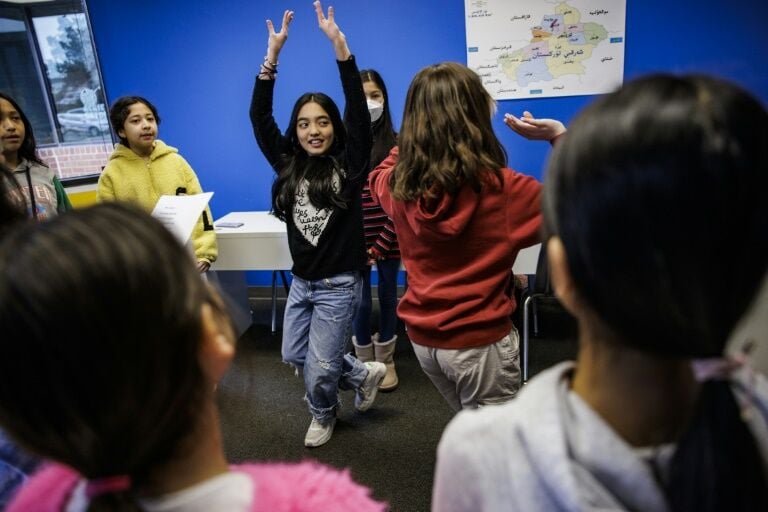Preserving Uyghur language and culture in US weekend schools

In a weekend school based in the US state of Virginia, the younger generation of Uyghurs are not only preserving their language and culture for posterity, but they are also learning vital vocabulary that will enable them to engage in discussions about the distressing situation faced by their loved ones in China.
The Uyghur language, history, and culture classes are held every Sunday at the Ana Care and Education Centre and are part of a larger network of Uyghur groups that aim to connect the diaspora in America. According to Irade Kashgary, who co-founded the school with her mother Sureyya, the centre tries to keep politics out of the equation.
Despite efforts to remain non-political, older students who are keen to learn about and discuss contemporary issues are given a safe space to understand the impact of the changing landscape on their lives and the lives of their extended families.
The school was established in 2017 by Kashgary and her mother, initially catering to a small number of students. As more people became disconnected from their relatives in China, the school experienced a significant growth in enrolment.
Kashgary told AFP…
“That sense of loss ignited this need to retain and preserve our culture and our language.”
Many of these students no longer have contact with their families in China, and the school plays a crucial role in keeping the Uyghur language and cultural ties alive for them.
China’s northwestern Xinjiang region, which many Uyghurs call East Turkestan, has seen a sharp increase in state-led persecution in recent years. As a result, numerous Uyghurs have migrated or fled to the United States and other parts of the world.
The US and various Western countries have accused China of committing widespread human rights abuses in Xinjiang, including the detention of over a million Uyghurs and other Muslim minorities in so-called re-education camps. These actions have been denounced as genocidal, something the Chinese government vehemently denies.
The school in Virginia is just one example of the ways Uyghur communities are banding together to protect their unique culture and language.
For example, in California, a Uyghur school helped 18 year old Muzart to read and write the language better, bringing him closer to his cultural roots. He said…
“I wasn’t able to grow up with such a tight-knit community, but thankfully the future generation will be able to.”
Muzart now volunteers with a summer programme in California that focuses on speaking Uyghur with the kids. He added…
“Youth are realising how important it is to preserve our culture.”
Zilala Mamat, an 18 year old university student from Michigan, co-founded a network for Uyghur youth in 2021 with the goal of connecting people through events and social media. She believes that a sense of community amongst Uyghur youth is desperately needed, as many have not been able to visit or meet anyone from their homeland due to the human rights abuses taking place there.
Young Uyghurs face unique challenges in their attempts to adapt to American life, while also grappling with the expectations of their Uyghur identity.
Asena Izgil, a 21-year-old student whose family fled China in 2017, said…
“We’re survivors of genocide, unlike people who are immigrants of their own will, it’s different for us.”
Many young Uyghurs feel the weight of these expectations from both their families and the international community, which can lead them to avoid group activities and make outreach a challenge.
However, maintaining their cultural roots remains essential for these students. Izgil recounts the resilience of her own family in the face of adversity.
“We eat Uyghur food, my mum teaches us to cook Uyghur food, we celebrate all the Uyghur holidays, we do all the religious practices that we couldn’t do back in our homeland – freely with no fear.”
Latest Thailand News
Follow The Thaiger on Google News:


























